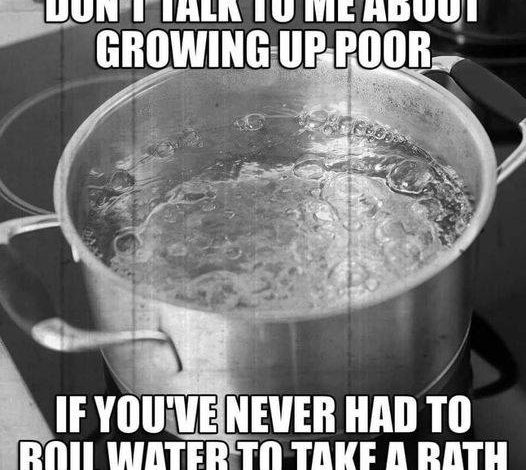
ADVERTISEMENT
The Unseen Struggles: Growing Up in Poverty and the Resilience It Breeds
ADVERTISEMENT
Introduction
Poverty is often discussed in terms of numbers—income levels, unemployment rates, and access to basic necessities. However, the lived experience of poverty goes far beyond these statistics. It shapes daily routines, alters perceptions, and leaves a lasting impact on those who endure it. One of the most telling signs of growing up poor is the need to improvise for basic needs, such as heating water to take a bath because there is no hot water available. This seemingly small act is emblematic of the larger, often unseen struggles that come with poverty.
**The Reality of Resourcefulness**
For many, the idea of not having access to hot water is unimaginable. Yet, for those who grew up in poverty, this was just another part of life. Boiling water on the stove and carefully mixing it with cold water to create a bearable temperature for a bath was a routine task, not an exception. It required careful planning, patience, and an understanding of how to make do with what was available.
This kind of resourcefulness is a common trait among those who grow up in poverty. When resources are scarce, every item and every drop of water is precious. This resourcefulness extends beyond just water—clothes are mended rather than replaced, meals are stretched to feed as many as possible, and nothing is wasted.
ADVERTISEMENT
**The Psychological Toll**
While resourcefulness can be a positive trait, the psychological toll of constantly having to make do can be significant. Living in poverty often means growing up with a constant awareness of what you don’t have, which can lead to feelings of inadequacy, stress, and anxiety. Children in these situations often learn to hide their struggles from their peers, leading to a sense of isolation and a fear of being judged.
Boiling water for a bath might seem like a small inconvenience, but it is symbolic of the larger, ongoing sacrifices that children in poverty must make. These sacrifices can lead to a deep sense of insecurity, as well as a drive to escape the circumstances that made such sacrifices necessary.
**Resilience Born from Adversity**
Despite the hardships, growing up in poverty can also foster incredible resilience. The ability to adapt, to find creative solutions to problems, and to persevere in the face of adversity are all traits that are often developed out of necessity. Those who grow up in poverty often carry these traits into adulthood, where they can become valuable life skills.
ADVERTISEMENT
Resilience is not just about surviving—it’s about thriving despite the odds. Many who grew up in poverty have used their experiences as motivation to achieve great things. The determination to provide a better life for themselves and their families often drives people to work harder, study longer, and push themselves beyond their limits.
**The Importance of Empathy**
Understanding the realities of growing up in poverty requires empathy. It’s easy to judge others based on appearances or to make assumptions about their lives without understanding the challenges they face. The image of boiling water for a bath serves as a powerful reminder that poverty is not just about financial hardship—it’s about the day-to-day struggles that often go unseen.
Empathy allows us to see beyond the surface and to recognize the strength and resilience that comes from overcoming adversity. It also reminds us of the importance of supporting those who are less fortunate, not just with charity, but with opportunities to improve their circumstances.
**Conclusion**
ADVERTISEMENT
Growing up in poverty is an experience that shapes people in profound ways. The act of boiling water for a bath is just one example of the many ways in which those who grow up poor learn to navigate the world with limited resources. While these experiences can be challenging, they also breed a unique kind of resilience—one that can carry people through the toughest of times and inspire them to create a better future for themselves and their families.
—
This article captures the essence of the meme while expanding on the broader themes of poverty, resourcefulness, resilience, and empathy.



